Rethinking Policing: Georgetown Law Responds to the Killing of George Floyd
July 24, 2020
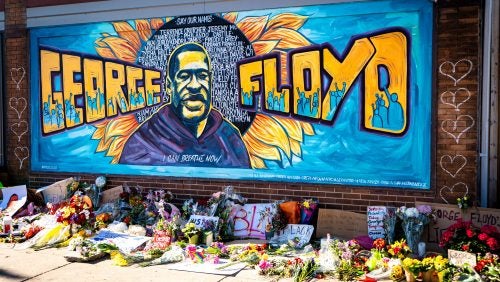
A mural outside Cup Foods in Minneapolis where George Floyd was murdered.
The shocking images of Minneapolis police pinning down and killing George Floyd on Memorial Day set off a nationwide wave of protests and impassioned public debate on how to finally end not only police brutality, but centuries of inequality and injustice.
On June 5, Georgetown Law Dean William M. Treanor invited the Law Center community to join the conversation in what would be the first of four online discussions to consider the context and aftermath of Floyd’s death.
In his introduction to the first panel, “Justice for George Floyd: Understanding and Responding to Minneapolis,” Treanor set the tone that would animate the series to come:
“We at Georgetown Law are a law center and a community dedicated to justice and service,” he said. “This is the time to channel your energy, your talents, your knowledge and yes, your anger and anguish and passion for justice into the change you want to ignite.”
Justice for George Floyd: Understanding and Responding to Minneapolis
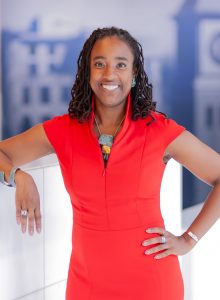
Professor Kris Henning
Georgetown Law Associate Dean and Professor Kristin Henning (L’97), a pioneering juvenile justice practitioner and scholar, took a lead role in organizing the series. As moderator of the first session, she opened by promising an “educational, empowering” series ahead.
“I, like so many others, refuse to stand by and let George’s death be in vain,” she said. “So I am happy to teach at an institution with the legal knowledge, the resources and a deep commitment to service — and to be of service in this moment.”
As director of Georgetown Law’s Juvenile Justice Initiative, Henning advocates for reform at the intersection of race, adolescence, and policing. Most recently, she partnered with the National Juvenile Defender Center to launch a year-long Ambassadors for Racial Justice program and a Racial Justice for Youth toolkit, both for juvenile defenders.
Henning invited Georgetown Law Professor Paul Butler, a former federal prosecutor and author of Chokehold: Policing Black Men, to provide an impactful account of what had transpired on the street corner in Minneapolis, and the legal implications.
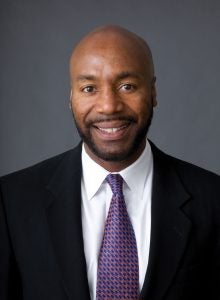
Professor Paul Butler
Their colleague, Professor Christy Lopez, added that one of the most “horrific” details was the fact that the other police officers present did not step in. Lopez spent years investigating unconstitutional policing while formerly at the U.S. Department of Justice’s Civil Rights Division.
“It is a different and additional harm to see those other officers standing there and doing nothing,” said Lopez. “Because what that tells communities is that this is not one officer who’s out of control, or a bad officer–this is the entire police force.”
Lopez co-directs Georgetown Law’s Innovative Policing Program, which recently launched the ABLE Project to support police departments in building a culture of peer intervention to prevent harm.
Drawing on his experience representing Michael Brown’s family in Ferguson, Mo., Howard Law Professor Justin Hansford (L’97) discussed the contours of protest law and referred viewers to bail funds and other resources. He noted that the reaction to Floyd’s killing had been intensified by multiple factors, such as the COVID-19 pandemic and the unemployment crisis it caused.
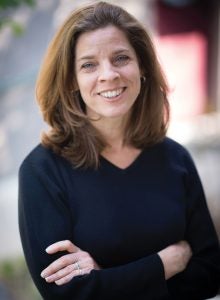
Professor Christy Lopez
Several speakers mentioned how difficult it was to watch the video of Floyd’s death.
“It is quite simply traumatizing,” said Mary Novak, Georgetown Law’s Associate Director for Ignatian Formation.
The panelists acknowledged complicated and deeply entrenched challenges ahead, and promised to continue to unpack them over the series of virtual discussions to follow. Butler said the idea of “police reform” might not go far enough, even though it would likely be a necessary first step.
“We have to think about transformation,” he said. “We didn’t talk about ‘reforming’ slavery. We talked about abolishing it, but on the way to that, reform is important.”
Lawyers have a lot to contribute to reform and policy change, he added. “It’s something that I’m so proud that our students, right now, are really involved in. That’s what gives me encouragement.”
Transforming the Police
The general public as well as the Georgetown community were invited to attend the following three sessions in the Rethinking the Police: Activism and Reform series.
Panelists in the next session, “Transforming the Police,” agreed that the idea of police reform was complicated in a country where law enforcement is very decentralized. Still, they said, it would be useful to have some kind of common consensus around best practices. As an example, Lynda Garcia, Policing Program director at The Leadership Conference on Civil and Human Rights, talked about the use-of-force standards being promoted by the “8 Can’t Wait” campaign, which include banning racial profiling and chokeholds, ending qualified immunity and establishing a national registry of officer misconduct.
Two of the panelists drew on their extensive experience working in police departments, including Marvin Haiman, executive director of the Professional Development Bureau of the D.C. Metropolitan Police Department. He said that many in the law enforcement community are sympathetic to at least part of calls for police reform, while cautioning a careful and deliberate approach.
“Police are asked to do many things that are, frankly, out of the scope of their responsibility,” Haiman said. “But in the absence of other government, or nonprofit, or other social services being available, law enforcement is who is expected to respond.”
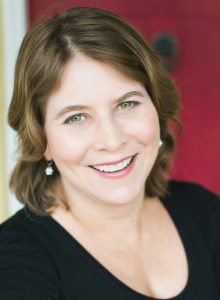
Professor Rosa Brooks
Ron Davis, a former police officer and city police chief who also served as Director of the U.S. Department of Justice COPS Office, said, “I’m not an abolitionist–I’m a reconstructionist. I think it’s time to construct a new system.”
“Law and order rhetoric is not safety,” he continued. “Peace and justice, public health, economic conditions, social conditions–that’s public safety. And law enforcement has a significant role, but not the only role.”
The panel was moderated by Associate Dean for Centers and Institutes and Scott K. Ginsburg Professor of Law and Policy Rosa Brooks, with Professor Christy Lopez returning as a panelist.
Preparing the Next Generation: Activism and Healing
Henning returned to moderate the third discussion, “Preparing the Next Generation: Activism and Healing.” Since the panel focused on emerging activists, Henning turned first to the youngest speaker, Janae Staicer (L’20), the immediate past president of Georgetown’s Black Law Students Association. She spoke about the range of emotions she had experienced while following the news and participating in demonstrations.
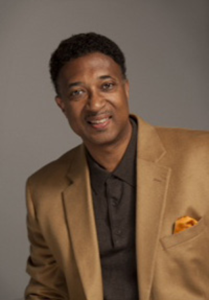
Professor Anthony Cook
Panelists including Advancement Project Executive Director Judith Browne Dianis and Georgetown Law Professor Anthony Cook shared advice from their own work in activism and community organizing. Cook noted that the Black community cannot solve systemic racism alone.
“This is not a sprint. It’s a marathon. And it requires a broad coalition who are into this intergenerationally,” said Cook.
The panelists counseled activists not to ignore the traumatic effects confronting racism can have, especially for people of color.
“It is okay to feel guilt or helpless. It’s okay to feel exhausted or raged. It’s simply okay to not be okay, because what we’re experiencing is not okay,” said clinical psychologist and diversity and inclusion counselor Justin Hopkins.
The speakers also discussed the key role allies play. Amy Uelmen, Lecturer in Religion and Professional Life at Georgetown Law, urged white people to be willing to withstand discomfort as part of the process of becoming aware of the pervasive legacy of racism.
“We have an opportunity to build deeper relationships where we really have ears to hear and eyes to see and hearts to commit to the deeper work of justice together,” she said.
Given the last as well as the first word of the discussion, Stacier echoed Uelmen’s call for allyship.
“Systemic racism and white supremacy… do not just exist in policing. They exist in literally every area of society,” Staicer said. “[N]o matter where you’re operating, there are ways that you can call out and critique racist practices as you see them. It’s not an easy task, but it is something that we absolutely need if we’re gonna fight this fight together.”
Police Abolition: What Does it Mean?
The fourth and final panel in the series, “Police Abolition: What Does it Mean?” focused on what has become one of the most controversial — and perhaps misunderstood — angles of the ongoing debate, attempting to provide the kind of context and nuance too often missing from public dialogue.
To start off the discussion, moderator Lopez asked civil rights attorney Tahir Duckett (L’17) to explain the concept of police abolition in his own words.
“Police and prisons have failed to do what they claim to do. That they don’t actually keep us safe, and in fact have been a source of immeasurable harm to individuals and communities, and in particular Black individuals and communities,” said Duckett. “If you’ve thought, ‘I don’t know how we save an institution that appears to be so far gone,’ … that’s the first step in being an abolitionist.”
Howard Law Professor Justin Hansford (L’97) drew on his experiences in Ferguson after Michael Brown, a young man, was killed by a police officer there in 2014 to explain how he gained a broader view on what law enforcement and justice could look like.
“If we’re going to abolish something like policing, or even maybe abolish imprisonment, we would have to move away from this conception of justice as revenge or retribution and think of another way to create justice for the families, for the communities that have been broken apart by the violence of the state, which the state initiated,” he said.
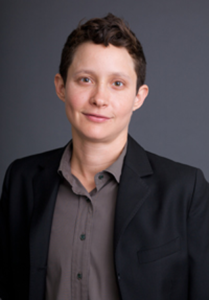
Professor Allegra McLeod
Georgetown Law Professor Allegra McLeod, a scholar of abolitionist movements, spoke of activists and organizations that have long been developing and promoting the idea of police abolition, and the inspiration they drew from the antislavery and civil rights movements.
Overall, the Rethinking Policing series drew several thousand registrants and hundreds of questions from the Georgetown community and beyond. In introducing the final session, Dean Treanor said the conversations had been both substantive and inspiring:
“Our aim with this series is to educate and empower those in pursuit of meaningful change — both in the wake of George Floyd’s death, and in the midst of a larger legacy of racial injustice in this country.”
All four events can be viewed on the Rethinking Policing series landing page.